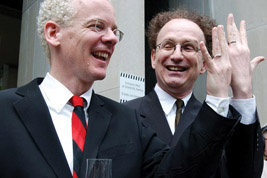
Aug. 11, 2003
Gay gesunderheit
Canadian gay crusaders win the right for same sex marriages
by Gil Zohar
TORONTO -
Michael Leshner and Michael Stark |
The couple, one of the seven pairs of litigants who sued the province of Ontario for that right, were waiting early that morning in a media scrum at Toronto's colonial-era Osgoode Hall courthouse for the historic judgment to be brought down. Toronto lawyer Joanna Radford had argued that since section 15 of Canada's Charter of Rights and Freedoms guarantees equality in matters of gender and sexual orientation, and since the federal government has exclusive jurisdiction over who can marry in Canada, therefore Ontario's refusal to solemnize same-sex ceremonies was unconstitutional. In a unanimous 3-0 decision, the provincial appellate court headed by Chief Justice Roy McMurtry concurred. A few hours later the Michaels were drinking champagne in front of those same reporters after becoming Canada's first same sex married couple. |
Their guerrilla stratagem of hastening to tie the knot before the federal government could seek leave to appeal to the Supreme Court of Canada proved unnecessary. The government decided not to appeal the ruling.
Hearing the appellate court's ruling, Leshner, 55, a normally straight-laced crown attorney, burst out singing I'm Getting Married In The Morning.
"I never thought I would see the day where gays and lesbians could marry," Stark, a 45-year-old project manager for a graphics arts company, said. "It's thrust us into the public domain to the point we've become poster boys for same sex rights marriage." The couple have been interviewed by media from as far as India, and a section on them in a Japanese-language book on same sex marriage about to be published was moved to chapter one.
For Leshner, who describes himself as "culturally Jewish to the nth degree," and Stark, a lapsed Catholic, the ruling - and subsequent decision by Ottawa to introduce groundbreaking legislation rewriting the age-old definition of marriage - caps nearly a decade and a half of activism. In 1992 Leshner scored his first major victory by gaining same sex benefits and pension rights for all Ontario civil servants. The marriage ruling is purely symbolic, he noted, as financial forms of discrimination had all previously been erased.
"The marriage case meant the end of legally sanctioned homophobia in Canada. There's nothing left," Leshner beamed. (Since the Divorce Act defines spouse as either "a man or a woman who are married to each other" however, ironically gays and lesbians may now marry but not divorce.)
"How you love and who you love is not the business of government," Stark added.
"From a Jewish perspective, being the grandchildren of penniless [Eastern European] immigrants, I think Michael and I were immigrants at a time when being gay was symbolically crossing an ocean," Leshner observed. "My grandparents taught me never to run with Cossacks, and this was a modern day Cossack story."
Calling homophobia a "post-modern anti-Semitism," Leshner noted Jews weren't innocent from this irrational pathology. "But to their credit they weren't the obstacle that the Catholic Church and fundamentalist Protestant churches proved to be. By and large, Jews didn't have the stomach for a cultural war against gays and lesbians."
Leshner termed his union with Stark just another form of intermarriage. His own mother, today 90, was present at the nuptials and sang Canada's national anthem at the ceremony, he added. By contrast, four decades ago she had bitterly fought her eldest son from marrying a non-Jewish woman.
"She learned that love trumps religion in almost every case," Leshner smiled.
While the same-sex marriage ruling has led to hundreds of gay and lesbian couples coming to Ontario to wed in recent weeks, including some where both partners are Jewish, none have yet been married under a chuppah. Canada's rabbis, arguing over how to interpret Leviticus 18:22 and 20:13, have been sharply split along denominational lines. Reform and Reconstructionist clergy have largely supported the move, while Orthodox rabbis have criticized it. Conservative leaders are divided
"We think that this actually strengthens the Jewish community and our society, and that's it's the right thing to do," observed Rabbi Irwin Zeplowitz, outgoing head of the Canadian Coalition of Liberal Rabbis for Same-Sex Marriage.
Toronto constitutional lawyer Ed Morgan, who acted on behalf of the group, applauded the Ontario Court of Appeal for "getting it right."
"This is the proper interpretation of equality of rights," said Morgan, who is also chair of the Ontario region for Canadian Jewish Congress. "Our understanding of equal rights was inevitably pushing the courts this way."
Leshner concluded the ruling was the ultimate vindication of his equality. "Being gay and Jewish is a mitzvah, not a shanda."
